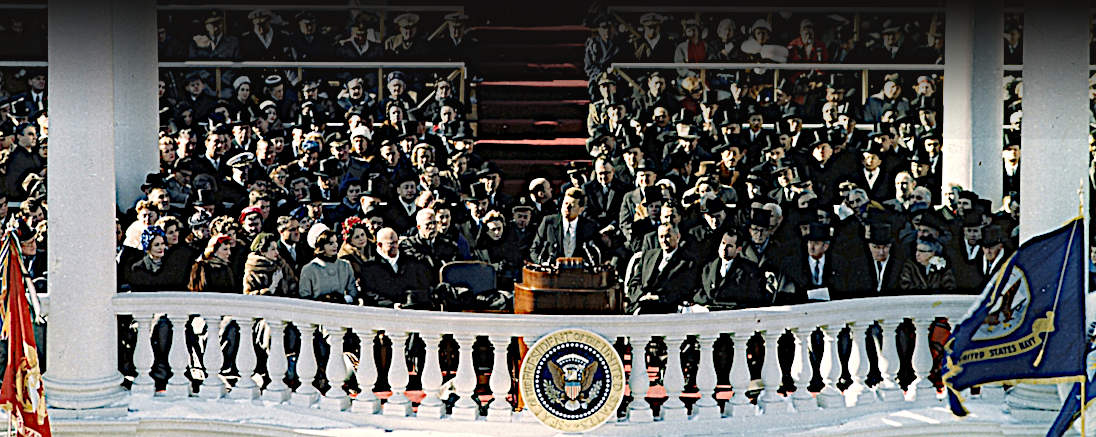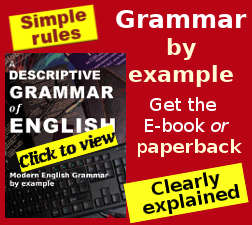
The decline of WASP America
From Kennedy to Trump
American society

The Kennedy presidency was a turning point for WASP America
President John F Kennedy has gone down as one of the great Americans of the twentieth century, remembered with a fondness that no other American president since then has managed to equal. It is not just because he was gunned down in his prime; the surge of emotion that spread worldwide when Kennedy was assassinated in Dallas in 1963 was not the cause of his almost mythical status, it was a consequence .
The Kennedy era, from 1961 to 1963, is remembered as a high point in modern American history; but as a high point, it was also a turning point, a short age which came in on a wave of optimism, yet went out in an outburst of national angst. Addressing the media in April 1961, Kennedy stressed the nature, openness and freedoms of American democracy. "Without debate, without criticism, no Administration and no country can succeed -- and no republic can survive. That is why the Athenian lawmaker Solon decreed it a crime for any citizen to shrink from controversy." It was significant that Kennedy depicted the liberties of the United States as being built on the wisdom of secular ancient Greece, not on any religious values.
The election of Kennedy was itself the first sign of a significant change in American society. Of course the Kennedys were white, they were establishment figures, but in one big way Kennedy was different from any previous American president. He was a Catholic, and the election of the first Catholic to the US Presidency was seen at the time as something remarkable. For Catholic Irish Americans in particular, the election of one of theirs was a victory over the Anglo-Protestant establishment, the WASPS (White Anglo-Saxon Protestants), who had held almost all power in the United States since the Declaration of Independence.
More generally the election of Kennedy raised huge hopes in the great age of the "American Dream", a dream according to which - in the words of the US Constitution - all men are born equal. The American Dream depicted the USA as a land where anyone can succeed and everyone can enjoy a high standard of living.
Yet there was a downside to the American Dream as it was imagined by so many Americans at the time. Since the founding of the United States, WASPs (in the broad sense of the term implying white Americans in general) had made up 80%- 90% of the US population, monopolizing power and authority throughout the USA. It took another dream, from another dreamer, Martin Luther King, to underscore the downside of the original American Dream. It was a WASP dream.
Although slavery had been abolished in 1865, black Americans had gained little power, and still commonly faced segregation in the American South a hundred years later. In 1954, the Supreme Court had outlawed discrimination in public schools, and the Civil Rights movement had begun. In 1963 Kennedy asked Congress to draw up a law definitively banning all forms of racial discrimination in the USA. This Civil Rights Act passed into law in 1964, but by then Kennedy had been assassinated.

The signing of the US Constitution in 1787; all power lies with men of white Anglo-Saxon protestant stock
Kennedy's election, his assassination, and the start of the Vietnam War over which he presided, were three key moments in the destabilisation of WASP America, in particular among ordinary working class Americans. Until then, there had been a general perception, encouraged by politicians and mirrored in the media, that the USA was the greatest place in the world.... and a nation built on traditional WASP and "Christian" values.
In actual fact the First Amendment to the US Constitution forbids the establishment of any official religion in the USA. The Founding Fathers knew that religion and politics could be a toxic mix, and had sensibly chosen to keep the two well apart.
The separation was slightly blurred in 1865, when President Abraham Lincoln signed the Act establishing "In God we trust" as the motto of the United States, words that have been inscribed on its banknotes and coins since then. Yet in their wisdom, the lawmakers who adopted the the motto did not specify who "God" was. In a country where over 90% of the population was Christian and white, defining "God" would have seemed pointless.
In the 100 years between the presidencies of Abraham Lincoln and John F. Kennedy, there was little decline in WASP hegemony in the USA. The Civil Rights legislation drawn up in the Kennedy era changed that; and some of those clinging to the idea that the United States was, and should always remain, a white Protestant country, felt that their fundamental beliefs were under threat.
The new America - love it or hate it
In the late sixties, the combination of Civil Rights activism and anti-war protest was seen by many elder Americans not as support for freedom and tolerance, but as an attack on traditional American values. Ultra-conservative politicians and evangelical preachers encouraged the view that America was in moral decline. For many in WASP America, this was made worse by an imaginary new threat coming not from within but from without – immigration.
Though the United States had always been a nation of immigrants, until the 1960s almost all immigrants had come from northern and eastern Europe. Yet a year after the Civil Rights Act, Congress passed the 1965 Immigration Act, opening up the USA to immigration from Southern Europe (a predominantly Catholic area) and Asia. A new multi-ethnic and multi-faith America was beginning to develop, and by 2020 "whites" only accounted for 61% of the population, the remainder being people of other ethnicities including Hispanics Asians blacks and people of mixed race. For most Americans, this is absolutely not a problem; but for a significant minority it is seen as an existential threat.

Donald Trump 's message strikes home with many ordinary white Americans
In the twenty-first century, the decline of the WASP hegemony in the United States is unstoppable. The most obvious signs of the new America have been the election of Barack Obama to the presidency in 2009, and the appointment of men and women of different races and religions to the highest functions in the land. Yet in in many parts of the USA, particularly in the South where the values of the Confederacy still color opinions even to this day, nostalgia for the hierarchies of bygone times remains strong.
In the 2016 Presidential Election, Donald Trump won with a slogan promising to "Make America Great Again" – a message that many of his supporters read as a call to roll back liberal-inspired diversity and take the USA back to the days of the WASP American dream. Not all, of course. It is important to stress that though 85% of Trump voters in 2020 where white, 15% were from other ethnic groups.
In 2023, following his appearance in a New York court on charges of fraud, Trump used biblical imagery, "Our country is going to hell," to rally his supporters - and many believe him.
In reality WASPS remain the largest single socio-ethnic group in the USA, they still hold more power than any other group, but their relative power is in inexorable decline and nothing is likely to change that. It's a question of demographics.
Discover grammar in a new light
"A breath of fresh air" - IATEFL Voices

Print & ebook from Amazon,
Print book from Barnes & Noble, Waterstones & other good bookshops
to strike a chord: to find sympathy with, to be in harmony with - fondness - love, appreciation - angst: anxiety - to decree: to make a law - shrink from: oppose, refuse - secular: humanistic, not- religious - previous: preceding - depict: show - downside: disadvantage - underscore - underline - to outlaw: to forbid - blur: confuse - Act: law - motto: short text - hegemony: domination by a group of people - under threat: at risk - evangelical: ultra protestant - preacher: man of the church - within: inside - faith: religion, belief - hierarchy: order of power - diversity: a society where people are different - to rally: to inspire- demographics: population statistics.
► More American history texts: Gettysburg (Advanced) - Ellis Island (Advanced) - Martin Luther King (Advanced) - Rosa Parks (Advanced) - Thanksgiving (Advanced) - Buffalo Bill (Intermediate)
Copyright notice.
This resource is © copyright Linguapress -
This text may not be reproduced on other websites nor in printed form without written permission from the publishers. Reproduction is authorised exclusively for personal use by students, or for use by teachers with their classes.
Student worksheet
1. Words, expressions and meaning. Choose the nearest equivalent of each of the following expressions: click the down arrow and select the correct answer.
- Founding:
- Surge:
- Obvious :
- Appointment :
- Under theat :
- The remainder :
- Bygone :
- Inexorable :
Synonym search... Each of the four expressions below is followed soon after in the text by a synonym or word / expression with a very similar meaning. Find the synonyms.
has gone down as
gunned down
to outlaw
For teachers
Vocabulary note for teachersanyone and everyone - the two words are used in the same sentence, and can be considered in this context as virtual synonyms. There is however a small difference: anyone has a selective meaning, everyone has an inclusive meanng.
broad - Note this synonym of the word wide; every student should have met the word already, in the context of the name Broadway... which therefore means?
Word families; ask students to find the noun based on the adjective wise - and the noun based on the verb to believe . What other noun in the text has the same ending as the noun from wise ?
Introduction
This text says a lot about American history in a very compact form. The aim is not to give a potted history of the USA , nor an assessment of the Kenndy era, but to explain the turmoil that has characterised American public life since the eruption on the political stage of Donald Trump. Trump did not come out of the blue, he came to power because he pedaled a message that resonated with millions of ordinary American voters, in particular with poorer (non-college educated) working class Americans, notably in the south, who feel that the American dream has missed them out.
The aim of this article is to place the Trump phenomenon in a historic continuum which began, as the article shows, with the great changes brought in under the Kennedy administration, and with the fractures that were caused within American society by the Vietnam war. The quintessential populist, Trump vowed - still vows - to "make America great again", to turn the clock back to a supposed golden age when America was "great" - whatever that means.
Before taking this article with your students, see what they know already. What do they know about..... WASPS (of any variety) J.F.Kennedy, Donald Trump, Barack Obama, Abraham Lincoln, Martin Luther King, Segregation, the Civil Rights movement ?

 Copyright
information.
Copyright
information.